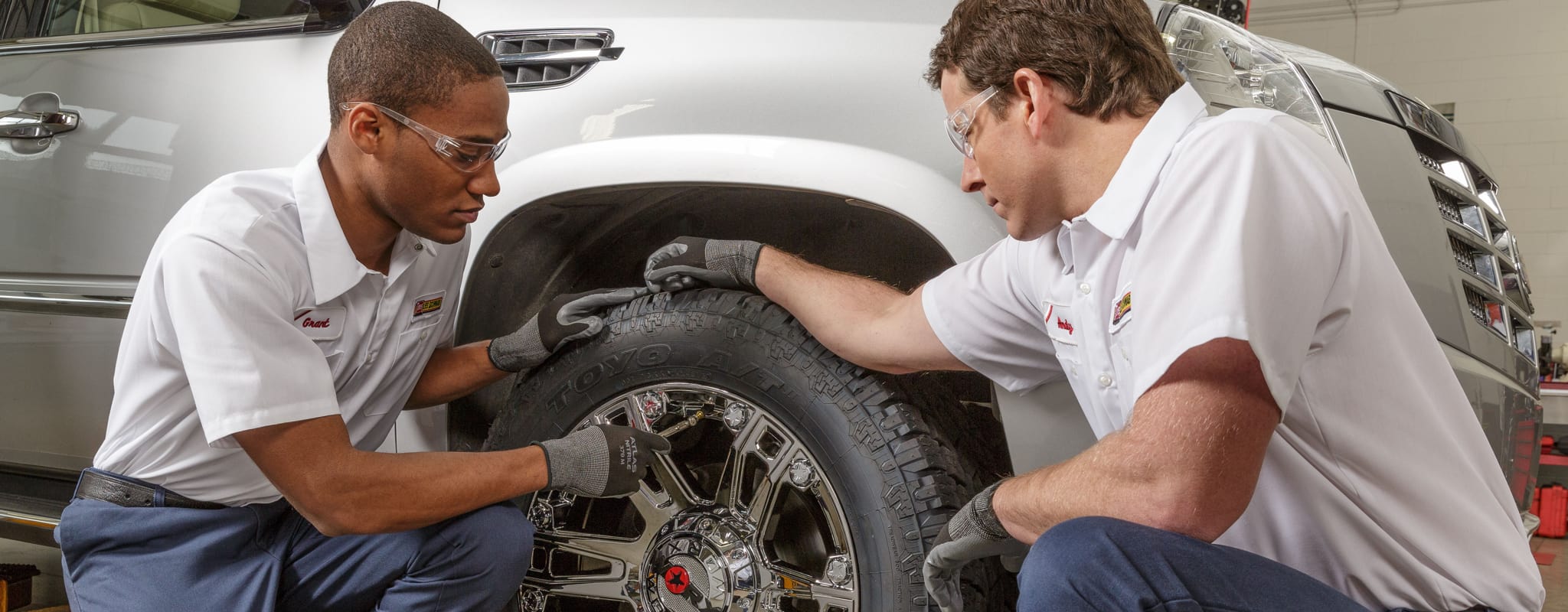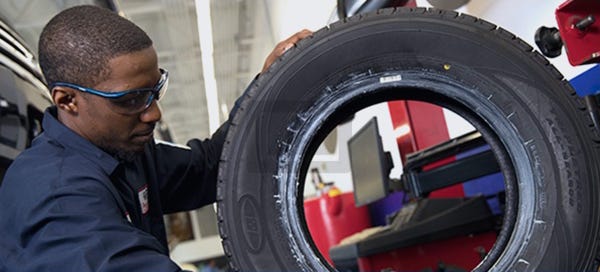Morris Tires: Your Partner for Expert GMC Tires Service
Morris Tires: Your Partner for Expert GMC Tires Service
Blog Article
Tire Solution: The Effect of Weather
When it comes to guaranteeing optimum efficiency and safety and security on the roadway, comprehending the impact of weather condition conditions on tire service is critical. GMC Tire Service. In this discussion, we will certainly check out the complex partnership between weather problems and tire service, dropping light on the significance of weather-specific tire upkeep practices and factors to consider.
Heat and Tire Efficiency
When subjected to high temperature levels, tires experience adjustments in performance that can substantially impact lorry safety and security and handling. The warmth created from prolonged driving or warm climate problems causes the tire rubber to soften, leading to lowered walk life and raised wear.

Cold Climate Impacts
Winter problems can have a considerable effect on tire efficiency and security. As temperatures decline, tire rubber can set, bring about reduced traction on icy or snow-covered roads. In chilly climate, tires might likewise lose air stress extra quickly, which can impact managing and gas performance. Furthermore, cold temperatures can create tire sidewalls to stiffen, raising the risk of damage from splits or various other road risks.
To mitigate the impacts of cool weather on tires, it is vital to routinely examine tire pressure and inflate them to the supplier's recommended levels. Using wintertime or all-season tires developed for winter conditions can likewise boost grip and hold on icy or snowy roads. Appropriate tire upkeep, consisting of regular evaluations for wear and damage, comes to be a lot more vital during chillier months to make sure optimal efficiency and safety.
Rainy Conditions Impact
During wet conditions, tire performance and safety can be significantly influenced by the damp roadway surfaces and lowered exposure. The step pattern of tires plays an essential role in preserving traction on wet roadways. Tires with worn-out footsteps are much more prone to hydroplaning, where a layer of water develops in between the tire and the roadway surface area, leading to loss of traction. To fight this, vehicle drivers must routinely inspect their tires for appropriate walk deepness and consider buying tires particularly made for wet conditions.
In addition, wet weather can additionally lower visibility, making it testing for vehicle drivers to see the road ahead clearly (GMC Tire Service). In such problems, it is necessary to change driving rates accordingly and keep a safe following distance to permit for unexpected quits. Correctly filled with air tires can also help in preserving control on damp roadways by giving much better handling and hold
Snow and Tire Safety And Security
Snow-covered roadways posture one-of-a-kind obstacles for motorists, highlighting the value of appropriate tire choice and upkeep. When driving in snowy problems, having the best tires can make a significant difference in safety and efficiency. Winter season sites tires are created with unique rubber substances and step patterns to give much better traction on snow and ice contrasted to all-season tires. The much deeper footsteps and sipes of wintertime tires help grip the roadway better, decreasing the danger of sliding and gliding.

It is vital to follow supplier directions when utilizing and mounting tire chains to prevent damages to the tires and car. By selecting the ideal tires, keeping proper inflation, and thinking about added grip aids like tire chains, chauffeurs can boost their security when navigating snow-covered roadways.
Weather-Related Tire Maintenance
When faced with numerous weather, correct tire upkeep comes to be an essential facet of vehicle security and performance. Weather-related tire upkeep includes a series of methods focused on guaranteeing optimum tire function and long life in different weather condition scenarios. One essential facet of weather-related tire maintenance is tire pressure policy. Changing temperatures can trigger tire pressure to vary, influencing traction and fuel performance. On a regular basis checking and adjusting tire stress according to manufacturer referrals is necessary for safe driving in transforming weather. Additionally, tire step depth plays a considerable duty in handling different climate aspects. Tires with adequate tread deepness give better hold on damp or icy roadways, lowering the risk of skidding or hydroplaning. Checking tire step consistently and replacing tires when walk wear gets to a certain deepness is crucial for keeping traction and stability in unfavorable weather. By focusing on weather-related tire maintenance, chauffeurs can enhance safety, boost vehicle performance, and prolong the life-span of their tires.
Final Thought
In verdict, weather problems have a significant influence on tire performance and safety and security. From warm influencing tire stress and put on to cool climate decreasing traction, it is essential to consider the weather condition when maintaining and using tires.
In this conversation, we will certainly check out the complex relationship in between climate conditions and tire service, shedding light on the importance of weather-specific tire maintenance techniques and factors to consider.

Report this page